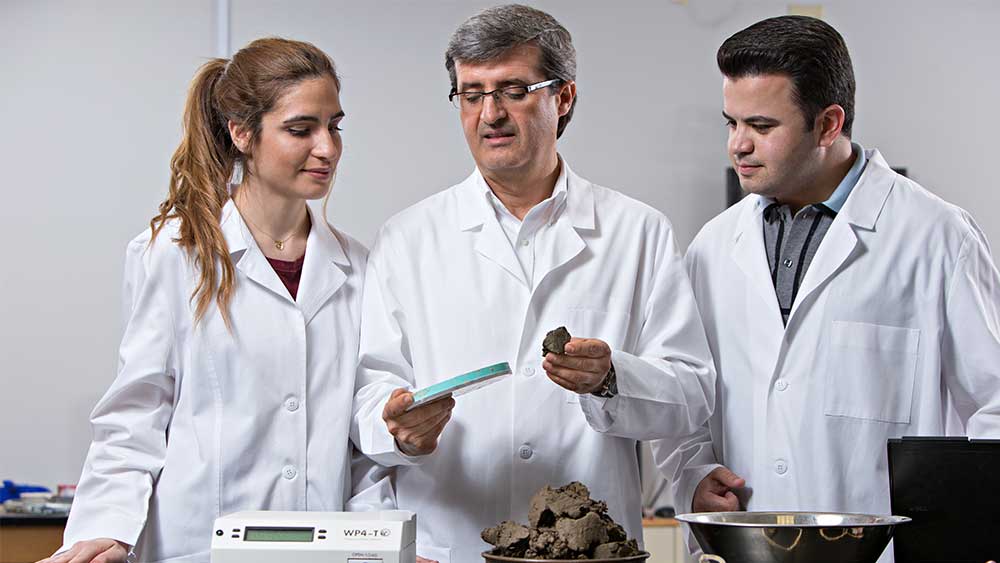
What is the Environmental Industry?
Engineers in the environmental industry solve some of the world's biggest problems, developing environmentally-friendly solutions for numerous industries. Whether you want to work in the agriculture industry, or in civil or architectural engineering, the opportunities are continuously expanding.Majors that Could Lead to Environmental Careers
Students interested in environmental careers could start their career paths through several majors offered by the Texas A&M University College of Engineering.
See below for a list of some of our majors that could lead to an environmental career.
- Architectural engineering: Within the scope of the environmental career field, architectural engineering focuses on the sustainability and the environmental impact of buildings and building systems. It investigates the building industry’s role in shaping large-scale ecological issues like human health, climate change and global warming.
- Biological and agricultural engineering: Biological and agricultural engineers create processes to convey water for efficient irrigation, to reduce erosion, to create agricultural and rural water systems that are responsive to climate change, and to use natural treatment systems for human, animal and agricultural waste products.
- Chemical engineering: Environmental and sustainability careers in chemical engineering focus on finding chemical solutions to pressing global issues. Chemical engineers develop organic, sustainable solutions such as gas alternatives and recyclable batteries. The field's broad scope allows chemical engineers to participate in career areas such as wastewater remediation and treatment, pollution control, and carbon capture.
- Civil engineering: Civil engineers apply science and engineering to develop solutions for protecting human health and welfare and for minimizing the adverse effects of human activities on the environment. Engineers provide potable water supplies; reduce emissions of pollutants by developing systems for treating air, water and hazardous wastes; predict the transport and effects of contaminants in natural environments; manage and remediate contaminated sites; and use engineering principles to protect public health.
- Computer engineering: Monitoring and sensing for green energy resources are two primary skill sets offered through computer engineering. Experience and knowledge in these areas will help engineers fit smoothly into an environmental career.
- Data engineering: Data Engineers analyze large datasets from multiple sources to analyze risks and mitigation strategies for environmental issues.
- Electrical engineering: Solar and wind power are two major aspects of environmental careers, and both of these are studied through an electrical engineering degree.
- Environmental engineering: Environmental engineers apply science and engineering to develop solutions to protect human health and welfare and minimize the adverse effects of human activities on the environment. Environmental engineers are involved in monitoring all aspects of the environment to develop standards that protect public health through the application of engineering principles.
- Industrial and systems engineering: Industrial engineers work to protect the environment by reducing waste from both systems and organizations. They are leaders in lean manufacturing and can work to minimize waste in systems while also maximizing productivity.
- Manufacturing and mechanical engineering technology: Students will gain knowledge of and experience with renewable energy, energy conversion, hybrid and electric vehicles, and energy storage, all of which are valuable topics in the environmental career field.
- Materials science engineering: Sustainable industrial processes and supply chains are impossible without sustainability in materials cycles. Material science engineers are heavily involved in developing new materials that can be made from sustainably harvested biological feedstocks and can be efficiently recycled to make new products.
- Mechanical engineering: Mechanical engineers are heavily involved in environmental career responsibilities, such as design/development of alternative energy systems, pollution reduction system design for equipment and transportation, and recycling processes. Other common areas revolve around waste and wastewater, and include wastewater management, waste disposal systems, and design of environmental products/systems for construction sites and wastewater runoff.
- Multidisciplinary engineering: A multidisciplinary engineering degree allows students to focus their technical capabilities on evolving science that affects human quality of life. Additionally, students learn about managing complex environmental issues that might include conservation and restoration of natural systems, water and wastewater treatment, and pollution prevention.
- Multidisciplinary engineering technology: There is a heavy focus on pollution within the environmental career field, and networked and electro-mechanical pollution monitoring systems are a responsibility that is largely tasked to engineers with a multidisciplinary engineering technology degree.
- Ocean engineering: Ocean engineers protect both the ocean and coastal areas through the analysis and design of systems for removing, isolating and treating contaminated underwater sediment in various water bodies. They are also commonly involved in the development of systems that protect against environmental degradation of the ocean and coastal waters, as well as the design and assembly of systems that meet environmental standards of water and air quality.
- Petroleum engineering: Petroleum engineers understand the complexities of ecosystems and strive to balance and sustain the environment while producing the energy that the global population needs. Because drilling, reservoir production, and reservoir management are governed by regulations to protect the planet, unique careers are possible in consulting, management, regulatory advisement and safety fields.